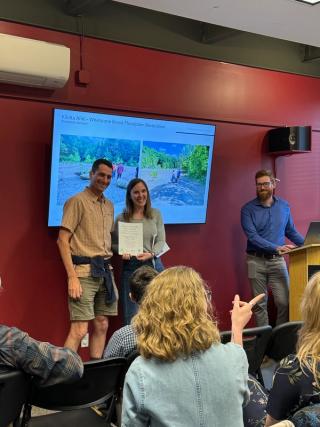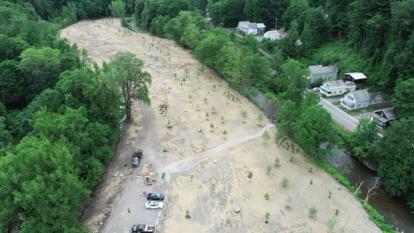
SLR receives Public Places Award by ASLA Vermont for Floodplain Restoration Project in Brattleboro, VT
- Post Date
- 29 April 2025
- Read Time
- 2 minutes

SLR is proud to announce that our project, Kikitta Ahki (formerly known as the Whetstone Brook Floodplain Restoration Initiative) has received a 2025 Public Places award from the Vermont American Society of Landscape Architects (ASLA VT).
SLR in partnership with the Town of Brattleboro and the Vermont River Conservancy, worked to complete the Whetstone Brook Floodplain Restoration Initiative into a sustainable, flood resilient park development. The area was renamed Kikitta Ahki, which comes from the indigenous Abenaki people, meaning Really Listen Land. Really Hear Land. Really Sharpen Land.

About Kikitta Ahki
During its industrial past, the floodplain at 250 Birge Street along the Whetstone Brook in the Town of Brattleboro, VT was used for lumber mill and log yard operations, leading to its nickname of “Sawdust Alley”. Long after logging operations had ceased in the area, the property sat dormant as a gated, gravel-filled floodplain filled with invasive poison ivy until it was purchased by the Vermont River Conservancy in 2014.
The Conservancy recognized the importance of this property and sought a plan forward to restore the floodplain in the area and provide the community open spaces to enjoy. SLR was enlisted to help restore and develop this new plan alongside The Conservancy, with additional funding from FEMA’s Hazard Mitigation Assistance Grant Program (HMGP), the Vermont Housing and Conservation Board (VHCB), a Vermont Resilient Communities Grant, and the US Environmental Protection Agency (EPA).
SLR was selected by the Vermont River Conservancy to design two primary components:
- Floodplain restoration – Once the built-up gravel was removed, to provide the engineering support to allow the floodplain to slow and spread within the property during high-water events.
- Park design – Prioritizing community need, public outreach events were held to identify park amenities and land use preferences, to design a rustic park that can accommodate flooding
The project spanned two construction seasons, so a winter shutdown took place where the excavation area was temporarily isolated from Whetstone Brook to control sediment and erosion. The project was completed on schedule and on budget.
The park has become a teaching opportunity for the community and region with schoolchildren producing a fluvial geomorphology interpretive dance, and others hanging river poems from the landmark willow tree. Groups interested in flood resiliency, urban forests, and edible landscapes from Massachusetts, New York, and Vermont have visited the site to inspire their own restoration/community development projects.
To learn more about Kikitta Ahki, click here.

